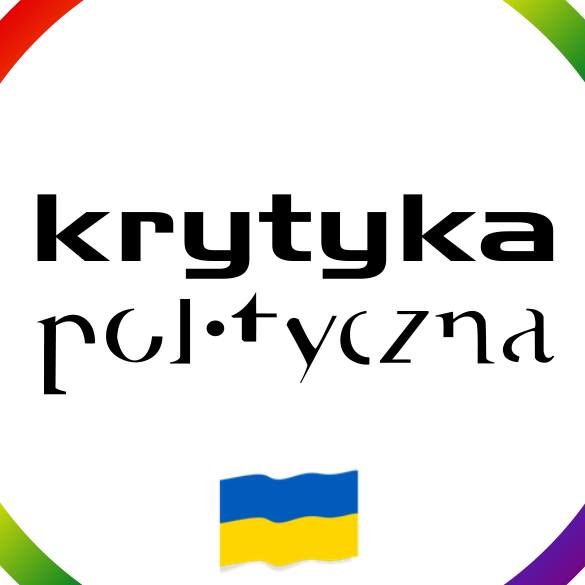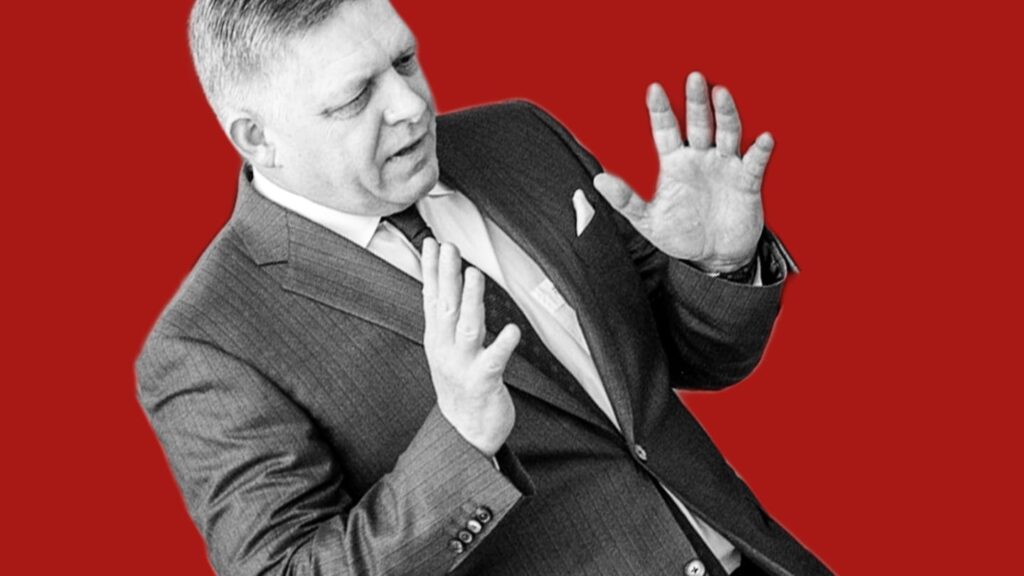Slovakia will hold the first round of presidential elections on Saturday, March 23. It can be assumed in advance that it will be won by Peter Pellegrini, whose Voice – Social Democracy party remains in a ruling coalition with Prime Minister Robert Fica’s corrupt, quasi-alt-left and nationalist SMER.
On January 26, Liptovsky Mikulash was, as usual in the evening, especially in winter, empty. Even the famous bear hasn’t gone to town yet. Only under the church of St. A pretty large crowd gathered at the end of the pedestrian street near the market, St. Nicholas Church.
– You can’t do everything! – shouted an activist speaking from the stand, directing his words at the government of Prime Minister Robert Fica, who, at the head of the leftist-nationalist populist SMER party, had just demolished the entire system of change that had been introduced under the slogan “For a Just Slovakia” after the murder of investigative journalist Jan Kuciak. – You will not succeed in dragging Slovakia back into the corruption swamp!
Those gathered applauded and shouted the same. However, it seems that Fico, who has been cursed seemingly for political eternity and returned to power after four years with a bang, can do whatever he wants. For example, he wants to ensure that he and his party colleagues are not held accountable for the crimes of his previous governments that he is accused of? And there you go.
Back in February, he led the parliament to vote through an amendment to the Criminal Code that eliminates the so-called “criminal code. The Special Prosecutor’s Office, a unit set up specifically to deal with cases of corruption among the country’s top politicians, as well as in hard-to-control institutions such as the police and courts. The Special Prosecutor’s Office was, moreover, looking into the case of Fica himself, concerning the creation of an organized criminal group at the top of the Slovak government.
It is worth adding that Attorney General Maroš Žilinka discontinued these proceedings under circumstances that raised, to put it mildly, reasonable doubts.
Daniel Lipšic, the former head of the Special Prosecutor’s Office, argued to no avail that the efficiency of the institution he heads is more than 90 percent. To no avail, opposition MPs boycotted the vote. The amendment passed. And it’s being processed under an expedited procedure.
Voters will forgive a lot
I ask Tomáš Valášek, former Slovak ambassador to NATO and former head of Carnegie Europe, and now deputy head of Progressive Slovakia, the largest opposition party, how it is possible that SMER voters are able to accept such obvious and vulgar assertion of impunity by politicians. Especially since one of the first decisions of the new government was to raise its own salaries. And it’s substantial, starting at 9,000. Euros for each minister, 10 thousand. For the deputy prime minister and even more for the prime minister.
Shortly thereafter, in January 2024, Prime Minister Fico bought himself a million-euro apartment in Bratislava (from a member of his own party), without bothering to explain how he paid for the luxuries. In 2021, his law firm in Bratislava was robbed, 50,000 euros disappeared. In the recordings released by the press, Fico says he didn’t report it to the police, because he didn’t want to explain where he got so much money.
The opposition and people supporting it protested against the amendment of the Penal Code. And what do SMER voters think of all this? – According to polls, up to 70 percent. of them do not support it,” Valášek says. – But politicians voted for the changes no matter what. The calculation is to do it quickly, at the beginning of the term. The parliamentary elections are far away, three and a half years away. In six months, everyone will have managed to forget. Besides, even now, despite the low support for the various decisions, SMER has dropped only one or two percentage points in the polls.
Everyone steals
SMER in the campaign did not hide what it was going to do, no one was surprised. How did he justify his plans? – They reiterated that there were violations under the previous government. That dozens of people have been falsely accused, without any evidence of guilt. There were, yes, court rulings that were challenged, but they were mainly procedural in nature. They said the defendants did not have sufficient access to their own lawyers.
The man who lashed out at anti-Fica protesters in Liptovsky Mikulash and – admittedly from a safe distance – shouted that the oppositionists were “American agents,” and who refused to introduce himself to me, gave a simpler answer.
– Every power steals, and Fico at least doesn’t pretend to be modest and that he doesn’t do anything for money,” he replied. – What he takes, he takes, but the rest of the money stays in the country. For Slovaks, not for Jews from America.
Okay, this solves the perennial problem highlighted by populists, whose name is “all politicians steal,” but how does Fico reach – and somehow, after all, he does – those 70 percent? Voters who disagree with such a stance?
Talking to Valášek, I wonder if the softer Voice party – Social Democracy of former Prime Minister Peter Pellegrini, which he founded after SMER was pompously ousted from power four and a half years ago, following the social upheaval of the death of corruption tracker Kuciak in high levels of government and a wave of protests – was to act as a buffer here. After the 2023 elections, Pellegrini entered, along with old-time nationalists from the Slovak National Party, into a coalition with SMER. He is such a clear favorite in the March presidential election that one can actually assume his victory in advance.
– Pellegrini’s support jumped compared to election day four months ago, but we [Progressive Slovakia – editor’s note] also went up, even though other opposition parties saw their support drop,” says Valášek.
– Has all that Slovakia gained from the anti-corruption movement initiated by Kuciak’s death been lost? – I ask. – Not everything. After all, sentences have been passed, people are in prison. Some of these sentences may be shortened, but not reversed. Today we know much more about what went on during SMER’s rule and the corrupt system that the formation built. The cases handled by the Special Prosecutor’s Office will now be distributed among other prosecutors’ offices. So I wouldn’t say all is lost, but it will certainly be more difficult to bring those involved in corruption under Fica to justice.
SMER’s pro-Putin thrusts
The European Commission is, of course, concerned about the changes the Fica government is implementing. She is also concerned about what many describe as a pro-Russian turn in international politics, practiced by parties that are part of the ruling coalition.
Prime Minister Fico himself claims that Ukraine “is not a fully sovereign country” because it is “fully dependent on the U.S.,” while the cause of the Russian invasion was the “madness” of some Ukrainians. It also demands an end to the “false demonization” of Vladimir Putin. Andrej Danko, deputy speaker of the Slovak parliament, believes that Russia is not the aggressor, it is only defending its interests, and that “the Russians came to these areas with the feeling that they were helping their nation.”
Ľuboš Blaha, parliamentary vice-chairman from SMER and also an alt-left philosopher and lecturer, regularly publishes pro-Kremlin and anti-Ukrainian content on his profile on Telegram. Every now and then he tries to create an atmosphere of scandal around himself. Among other things, he appeared in the media. that the portrait President Zuzana Čaputova (referred to by Fic as an “American agent”) in his parliamentary office replaced with a portrait of Che Guevara, and the fact that he gave an interview to a journalist from Russian state television Rossiya1 in which he endorsed anti-EU and anti-Ukrainian slogans appearing at protests by Slovakian farmers (their narrative largely parallels that of protesters in Poland). In the same interview, he praised the time when Slovakia could buy “cheap gas from Russia” and not, as now, “expensive gas from America.”
Blaha is also one of the people pushing the populist-left SMER, a fairly traditional kleptocratic party of power for transformational Central and Eastern Europe, into the much sexier, at least in some circles, frame of the leftist (and sometimes right-wing) populist-supporting alt-left. At least some of the editors of the Polish left-wing “New Citizen” also seem to sympathize with SMER (judging at least by their social media posts), although they do not radically agree with him on the war in Ukraine.
Blaha interprets the Russian-Ukrainian conflict in the context of “the struggle between the underdeveloped periphery and the exploiting center,” but does not particularly nuance these issues, seeming to see neither the difference in the quality and attractiveness of Russian and Western democracy, nor the independent choices of countries to be in one sphere of influence or another. For example, on March 19, 2024, he thanked on Telegram “the brave young people representing Slovakia, the peace-loving anti-fascists” taking part in this year’s World Youth and Student Festival in Sochi, who were “visited by President Putin and Minister Lavrov,” and called the Progressive Slovakia members who criticized them for it “hyenas.” These young people, Blaha claimed, simply “love Russia, its culture and history,” and for this reason alone “are criminals to liberals,” while “Ukrainian bandits threaten them with death just because they want peace.”
Slovaxit will not be
Fico himself fraternizes with the pro-Russian (or at least sitting on the barricade with a strong lean toward the Kremlin) Hungarian Prime Minister Viktor Orbán, and with the Ukrainian side, yes, he met, but with great grace and just across the Slovakian border, in Uzhhorod, which belonged to Czechoslovakia in the interwar period.
However, Fico is not interested in getting actively involved in the conflict on the Russian side. He uses anti-Ukrainian rhetoric mainly to have cards he can sacrifice in a dispute with the European Commission, concerned about changes in the rule of law. If it’s politically calculating for him – he lets it go. Provides humanitarian aid to Ukraine, gives permission to carry out civilian projects with Kiev.
Tomáš Valášek, who was Slovakia’s representative to NATO, when asked if his country was getting off the Euro-Atlantic and EU path, until he quips. – No exaggeration. Yes, they are doing damage to our reputation in the West, but leaving Western structures is not an option, as it was for Poland under Mr. Kaczynski. We are facing more or less the same thing you experienced. Fico is too smart to threaten Slovakia’s membership in the European Union, because the form of free market afforded by being part of the alliance is the goose that lays the golden eggs.
He adds that Poland has a strong domestic demand, spurring the economy. – That’s why you didn’t even have one quarter of recession during the 2009-2010 crisis. Slovakia’s economic structure is entirely dependent on exports and imports. We are a country where a lot of cars are produced, more car companies are building factories in our country, and Volvo’s investment in an electric machine factory is on the horizon. Fico needs a strong economy if only to avoid having to introduce deep reforms that would hit everyone in the pockets. So it will maintain the “EU minimum” needed to be a country that attracts investment. Leaving the Union would mean spooking investors. In fact, just look at the economic impact of brexit.
In a Central European country that still has a reputation in the world as post-communist and therefore suspect, the effects could be even more severe. – That’s why Fico will do what Orbán did: bark a lot and fight less,” says Valášek. – But this also harms Slovakia, because if, like Hungary or formerly Poland, we are mainly a blocking force, as we were in the case of the migration pact, how will other EU countries react when, due to events in Ukraine and the U.S., there are gigantic subsidies for the arms industry and Slovakia comes to the table asking for a piece of the pie?
It should be added that the Slovak arms industry continues to make money from selling weapons to Ukraine. Fico has repeatedly stressed that his country will no longer arm Kiev, but (quite like a racial liberal) he has no objection to Slovak companies doing so.
The anti-Ukrainian narrative prevalent in Bratislava, however, has managed to deteriorate relations with Prague. Indeed, Czech Prime Minister Petr Fiala has announced that he is suspending the annual intergovernmental consultations. The drop that poured the blackness was a meeting between Slovak Foreign Minister Juraj Blanar and Russian Foreign Ministry chief Sergey Lavrov. Fico is making fisticuffs, shifting the blame to the Czechs. According to him, the Slovak government “only talks about peace,” while the pro-Ukrainian Czech government is “interested in supporting the war in Ukraine.”
The uncorrupted left is lacking, but there are liberals
There is also concern in Europe about another Fica plan, similar to the one implemented in Hungary by Orbán and to some extent by Kaczynski in Poland – it is about reforming public media in the spirit of politicizing them.
The opposition side of the Slovak political scene is dominated by the democratic, socially progressive and pro-Western, but fairly liberal narrative of Progressive Slovakia.
– We are getting better and better results,” says Valášek. – And given the turnout at the protests we organize, it looks like the trend will continue. We work well with the other opposition parties, namely the Christian Democrats of the Christian Democratic Movement and the liberals of the Freedom and Solidarity party. This undermines the theory that liberals and conservatives cannot work together. We have some differences of opinion, for example, when it comes to gay marriage, but we unanimously recognize the rule of law as inalienable.
A long march lies ahead for the Slovak liberals. Before those who dream of a non-corrupt and pro-Western left – even longer.
**
Funded by the European Union. The views and opinions expressed are those of the authors and do not necessarily reflect the views of the European Union or the Directorate General for Economic and Financial Affairs. Communication Networks, Content and Technology. Neither the European Union nor the funding body is responsible for them.
**





